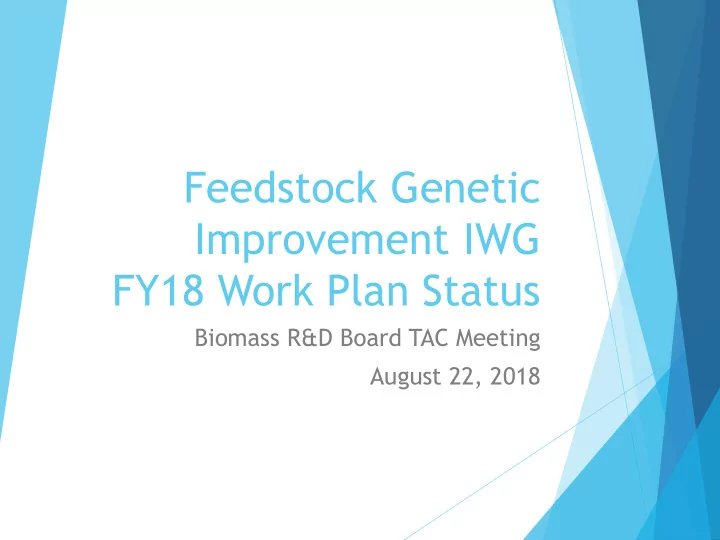

Feedstock Genetic Improvement IWG FY18 Work Plan Status Biomass R&D Board TAC Meeting August 22, 2018
Key Activities/Deliverables Planned in FY18 • Develop productive, high yielding, regionally-adapted biomass and oilseed crops for cost-competitive production of biofuels and bioproducts. • Establish a fully developed biofuel and bioproducts production pipeline, from basic science to translation of improved feedstocks, commercial deployment, and production. • Support a stable policy and regulatory process regarding growth of biotech crops that provides confidence in marketable products, as well as consumer confidence in their safety. • Other topics as considered timely and relevant.
Progress Toward FY18 Deliverables Agency programs include support for: • Genetic improvement of non-food oilseed crops; • Advanced engineering of bioenergy crops through gene editing and synthetic biology; • Investigations of photosynthesis and energy conversion towards development of strategies for enhancing photosynthetic efficiency and enzyme function; • New field-based, high-throughput phenotyping tools to facilitate incorporation of genetic improvements into elite crop varieties. Specific scientific accomplishments: • Development of transgenic plants with altered lignin composition to allow easier deconstruction of the cell wall into constituent sugars without compromising plant vigor; • Liberty TM , the first publicly available highly productive switchgrass cultivar; • Commercial guayule farming system - successful production of 100% guayule- rubber passenger tires that meet all industry specifications.
FY18-19 Path Forward • Continue to assess research and development needs to promote development of improved crops for biofuels and bioproducts while conserving natural resources. • Establish a robust working relationship with working groups involved with downstream processes, such as Feedstock Production and Management, Feedstock Logistics and Conversion, to gain insight into deployment needs that could inform basic research. • Strategically support data management, database interoperability, and open access to publicly funded data and germplasm resources, as well as risk assessment and stable regulation of genetically modified feedstock plants. 4
Recommend
More recommend